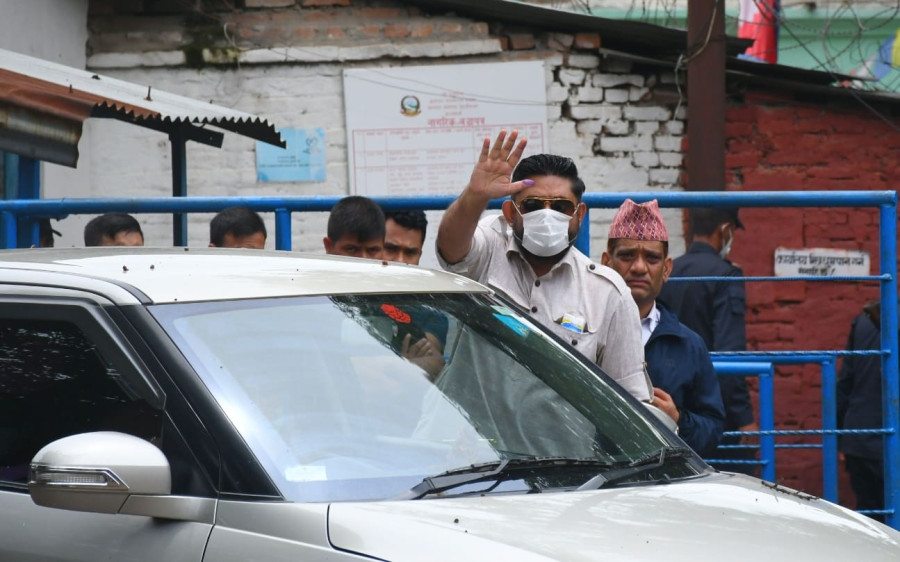National
Attorney general questions Supreme Court verdict on Koirala case
The former DIG of the Armed Police Force convicted of murdering his wife was released Thursday following top court’s order.
Tika R Pradhan
The Office of the Attorney General on Thursday filed a petition at the Supreme Court seeking a review of its June 29 decision to shorten the prison sentence handed to Ranjan Koirala, a former deputy inspector general of the Armed Police Police Force, convicted for the murder of his wife eight-and-a-half years ago.
The petition comes as former Supreme Court judges, among other legal practitioners, decried the decision of a bench comprising Chief Justice Cholendra Sumsher Rana and Justice Tej Bahadur KC to shorten the life imprisonment sentence ordered by a lower court by 11 years.
Kathmandu District Court had found Koirala guilty of pre-mediated murder of his wife Gita Dhakal in January 2012 and handed a sentence of life imprisonment with confiscation of his property. Dhakal’s body had been cut into pieces and burnt.
The decision had later been upheld by the Patan Appellate Court.
According to the Muluki Ain (country code), life imprisonment sentence is equivalent to a 20-year sentence although the new criminal code that came into effect in 2018 replacing the Muluki Ain has raised that to 25 years.
Following the court’s verdict, Koirala was released on Thursday after serving eight-and-a-half years jail term as that was what was left of his sentence after the revision.
“We received the petition from the attorney general late today,” said Bhadrakali Pokhrel, spokesperson for the Supreme Court.
According to an official at the Attorney General’s office, the petition has questioned the decision to reduce the jail-term using an outdated law. The official said it has also claimed that the seriousness of the crime does not allow reduction of the punishment and has claimed that the top court made improper use of the existing legal provisions.
The Supreme Court, in its June 29 verdict, had said it had decided to shorten Koirala’s prison sentence as he has the responsibility to raise his children, who have been without their parents for a long time.
Koirala’s action had been a crime of passion as he was then having an affair with another woman. The other woman, Tara Regmi, who had served a one-year jail sentence for aiding and abeting the murder, received Koirala outside the prison gate.
The dignity of the judiciary has been questioned with the latest verdict, according to Balaram KC, a former Supreme Court justice.
KC said there are many errors in the decision. “It is the right of the trial court to fix the quantum of punishment,” KC told the Post.
According to KC, the higher court is supposed to correct wrong decisions passed by lower courts, but in the case of Koirala, it’s just the opposite. “It shows that the Supreme Court was in a hurry to release Koirala,” he said.
Gauri Bahadur Karki, former chief of the Special Court, said that the verdict is faulty as it cited number 188 of the [erstwhile] Muluki Ain to decrease not only the quantum of the punishment, but also used the new prevailing legal provision to ensure that Koirala’s property is not confiscated, therefore basing its decision on two legal provisions which were not active when the crime was committed.
While the old Muluki Ain had provisions to allow the government to confiscate the property of convicts in grave criminal cases, the provision has been done away with in the new criminal code.
If the Supreme Court accepts the attorney’s petition, it will now be presented before the full bench of the court, which will exclude Chief Justice Cholendra Sumsher Rana and Justice Tej Bahadur KC since they had passed this verdict.
Employing number 188 of the Muluki Ain (chapter on court management), the two justices decided that the quantum of punishment seemed to be high as the crime seems to have been committed without a mens rea—intention to kill.
Number 188 of the Muluki Ain gives discretionary power to the judges to determine the quantum of punishment in a given case. But it has been misused here, legal practitioners argue.
“There are certain circumstances under which such discretionary rights could be used— for example when a girl aborts her child illegally due to the fear of society,” said Karki. “In the case of Koirala, the evidence against him suggests that he misused his high authority to kill his wife.”
At least two senior advocates have termed this murder as a ‘severe cold-blooded’ crime.
“Number 188 cannot be used in a case in which the body of the victim is not recovered and the family doesn’t get to complete the last rites. The provision can only be used in cases where the defendant files a plea bargain owning up the crime,” said a senior advocate requesting anonymity.
He also questioned the principle used to reduce the punishment of 20 years to eight-and-a-half years.




 16.12°C Kathmandu
16.12°C Kathmandu















